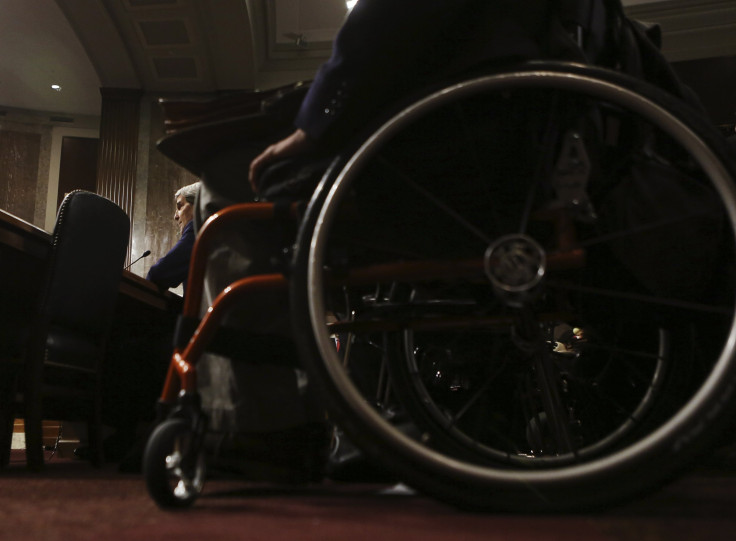When Should Disabled People Be Paid Less Than Minimum Wage? Curtis Decker Says Never


Those who think the working poor are better off without a set minimum wage need look no further than the estimated 420,000 mentally and physically disabled workers who can legally be paid well under the federally mandated $7.25 an hour that covers most working Americans.
While this Depression-era policy had good intentions – to give crippled returning veterans at the time a shot at private-sector employment – it has become adopted largely by the very groups that advocate for disabled people’s rights. The program, known as Section 14(c) of the Fair Labor Standards Act of 1938, has become an integral part of so-called sheltered workshops inside which disabled workers perform manul labor tasks, such as laundry for Army bases.
Some families of these workers see this as a benevolent situation, a place for their handicapped relatives to go to earn a stipend to supplement their Social Security and Medicaid support. Some of the biggest disabled-rights umbrella groups, like United Cerebral Palsy, have affiliates that use the program and claim they couldn’t run their non-profit workshops otherwise. Defenders of the policy say some of these people are so severely disabled that they wouldn’t find any work without the program and the sheltered workshops that use them.
Meanwhile, disabled people are three times more likely to live in poverty in the United States while less than one in five of them participate in the workforce, according to the National Council on Disability.
Curtis Decker is trying to change that.
The executive director of the National Disability Rights Network, a 32-year-old organization that has worked to get disabled people out of institutions and opposes the Section 14(c) program, organizes field research into the nation’s sheltered workshops, interviewing workers and collecting data on disabled subminimum wage earners.
Decker spoke with International Business Times recently about the subject and how his organization has been working to raise the profile of sheltered workshop labor.

IBTIMES: Disabled workers are the only category of employee that doesn’t have a wage floor. For example, student-learners cannot be paid less than 75 percent of the local minimum wage, and only if they’re enrolled in higher education. Adult workers under the age of 21 cannot be paid less than $4.25 an hour, and only then for up to 90 days before their wages have to go up. But for disabled workers employers fill out paperwork that’s ostensibly what the Department of Labor calls an “objective gauge” of how much less productive a disabled worker is compared to a fully abled one. And there’s no minimum. If a worker is considered to be only 20% as productive as an abled worker then then he or she would get $1.45 an hour.
DECKER: This is one of these well-intentioned ideas that has gone off the rails over the years. The rules were put in place in the 1930s and it was veterans-oriented. The idea was that you had these returning wounded veterans and if you let private employers pay them less than the minimum wage that would encourage them to hire wounded veterans into the workforce. This never really happened in any great number, but what did come along were disability organizations who created workshops for their clients. What you have now is that the vast majority of sheltered workshops are run by disability groups, like Goodwill, United Cerebral Palsy, Easter Seals, all kinds of other non-profit disability organizations who use the 14(c) certificate. What was also supposed to happen was that these workplaces were supposed to train these workers and give them certain skills for them to go out into the workforce. What has happened is some people stay at these places for 15, 20, 30 years.
IBTIMES: Let me get this right, you’re saying the one of the biggest utilizers of Section 14(c) certificates are the rights groups themselves?
DECKER: Right. These are the very organizations we’re in coalition with. But then suddenly, with this issue we are in conflict with them. There are also abuses in the private sector. We had that big scandal out in Iowa with Henry’s Turkey Service. It was a private business, and they were not only paying these men with mental disabilities crap wages but they were also taking their Social Security checks and putting them in really substandard housing. It was absolutely egregious. So there are private businesses that pay these people subminimum wage but a vast majority of 14(c) certificate workshops are run by disability groups.
IBTIMES: Why can’t these groups simply pay a minimum wage?
DECKER: Good question. Sen. Tom Harkin [D-IA] has been looking at various ways on how to deal with this. He gets a lot of push back from non-profit groups. His first proposal was to say you can’t go below 50 percent of minimum wage [$3.70 an hour]. And people howled and carried on. So he dropped it to one-third [$2.40 an hour]. Well, I was invited to a meeting with sheltered workshop providers around that time. I had previously had my summer interns look though the Form 990s [the annual reporting return for tax-exempt non-profits] and check the salaries of the executives and senior staff of these groups. So I’m in this room and they’re on their feet screaming at me, saying that if they had to pay everybody in the workshop a third of the minimum wage they would go out of business. And I said, “Really, because it says here you’re making $250,000 a year, and you over there are making $300,000 a year and that guy there is making $400,000 a year, but you will go out of business if you have to pay your workers a third of the minimum wage?”
IBTIMES: What do families think of their disabled relatives working in an environment where the employer determines the minimum wage in accordance to the Section 14(c) rules?
DECKER: Some want their disabled relatives integrated [working in a non-segregated environment for a private employer] and making at least minimum wage. But you have others who say, “Listen, leave it alone. It’s OK. She gets her social security check. She makes a little extra money. She gets out of the house every day. She’s not sitting at home watching television. I can go to work and this is a place she can go to. And you come along and want to disrupt this thing, you’re going to make my life miserable.”
IBTIMES: How do you answer that?
DECKER: I have to tell them that this isn’t about them. Our job is to represent the person with the disability. You can go into a sheltered workshop any day of the week and go up to workers and find someone saying they like the job, and that their friends are there. Like anybody else, you’ve been doing the same job for 10 or 15 years. You can’t make an informed decision if you haven’t experienced anything else. We would have the same issue when going into institutions – you find people who are asking you to get them out of there, and others who don’t know what the alternative is, or where you want to take them, or whether they’ll be separated from their friends if they get out. You have to slowly acclimate them to coming out of institutional homes, tell them that they can enter a community, eat their own food, and have their own room, that there are alternatives to sharing a bathroom with 35 people. It takes time for people who have had no other experience to be able to realize how much better their living circumstances can be. It’s the same in sheltered workshops.
IBTIMES: So your group goes out into the field and interviews these workers. What are you hearing from them?
DECKER: We have several projects right now. We have one in Connecticut. We did one in Rhode Island. And where about to start one in Florida. We’re sending our people out to interview the people in the workshops. We want to get a handle of what’s going on out there. One of the things we get that blows my mind is we ask people in these shops with intellectual disabilities if they like their job. I’ve heard then say, “It’s fine, we like the people here but I like my other job better.”
We ask them, “what other job?”
And we find out some of them are working a second job, say at grocery story, for minimum wage. So we find people who are working three days a week for minimum wage somewhere and then come into the sheltered workshop where somebody has determined they’re 25 percent productive and pays them 25 percent of minimum wage [$1.81 per hour].
IBTIMES: And this is legal.
DECKER: In these cases, yes. The law says you determine the wage by comparing comparable jobs. Some of these workshops have laundry contracts with Army bases, so they’re working a washing machine for less than minimum wage. Then they’re going and working a grocery store checkout counter somewhere else part time for minimum wage. How much different are these two jobs, really?
When I first got into this business in the 1980s I found this sheltered workshop in Maryland. The woman running the operation was very clever. Every time one of the workers got proficient in a job she would move them to another job. So it was harder for these workers to get to a point where they could prove enough proficiency to be moved out of the sheltered workshop into a private business at minimum wage. She would instead move them to another job and say, “You’re 20 percent efficient at this new job so I’m going to pay you 20 percent of minimum wage.” You see she didn’t want to lose her good workers.
That’s part of what’s so crazy about this. This is supposed to be a training ground to get people out, but what happens is the employer gets these contracts from local businesses and military bases and you’ve got to perform. You don’t want to lose your highest performing workers. There’s a financial incentive to keep the best disabled workers in these sheltered workshops and keep moving them around. That was back in the 80s, but it wouldn’t surprise me if this is still happening considering there are places where workers have been in these shops 20 years. Clearly they’re not just being trained to do something that would get them out in the community.
IBTIMES: Determining by how much less productive a person is compared to another person seems to entail a certain amount of subjective evaluation, and that an employer would have an incentive to low-ball this kind of estimate, to get the wages down as much as possible. If they’re applying for Section 14(c) then clearly they want to pay all or some of their employees’ subminimum wage.
DECKER: There’s another side to every story. There are a lot of family members [of physically or mentally disabled persons] who are very upset with us, because they feel like these sheltered workshops are places where their sons or daughters can go. The parents know they probably can’t get a job elsewhere, given the economy, and the stigma, and employers not wanting to hire them. Some of these places do hire very, very disabled people and I have good friends and colleagues that work for these programs who say they could never, ever get a job in the ‘real’ world. So if they’re making 30 cents an hour plus Social Security then what’s the big deal?
It would be a little like going around to my employees saying, “I’m going to pay you half because I’ve decided you're half as productive.” I think, again, this system was created with good intentions and then we as a country sort-of forgot about it. For us it’s two issues: the first is about the segregation of these people with other disabled people all day long, not interacting with other people. This is a major concept now in disability policy – get these people with disabilities into the mainstream society. There are some programs that are pretty lucrative. They get preference with federal – especially defense – contracts. These workers make pretty decent money, like $15 an hour. But they’re doing it in a very segregated environment, a building or workshop. Both issues are bad: we don’t condone the segregation of disabled workers and we also don’t want them being paid less than the minimum wage.
© Copyright IBTimes 2024. All rights reserved.












